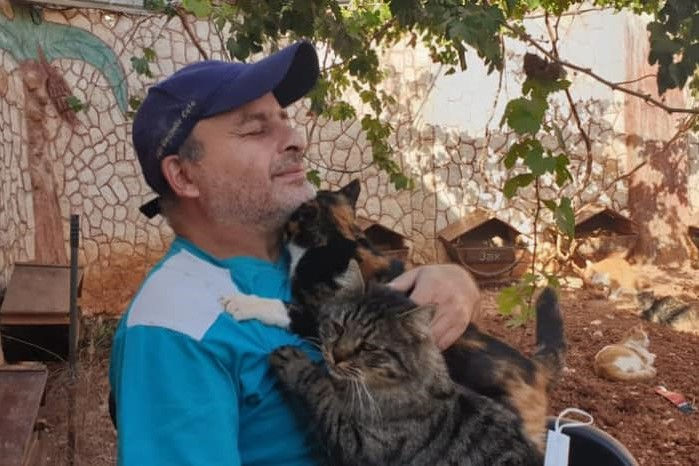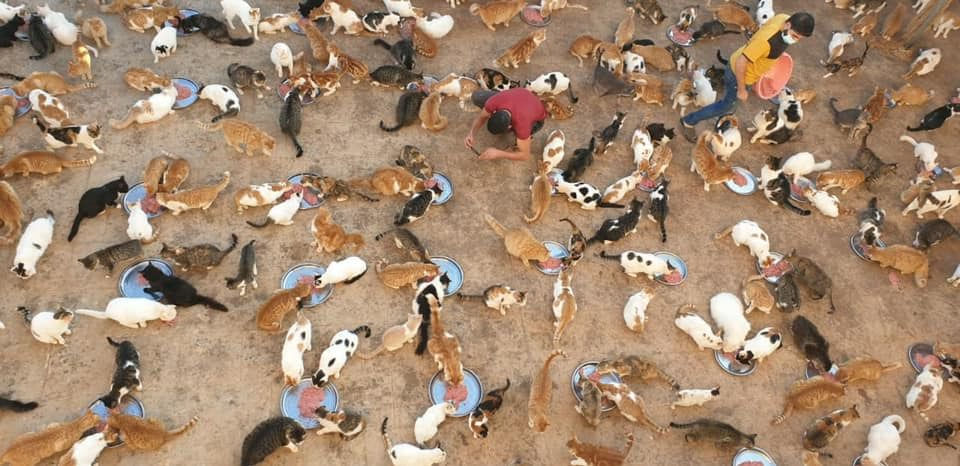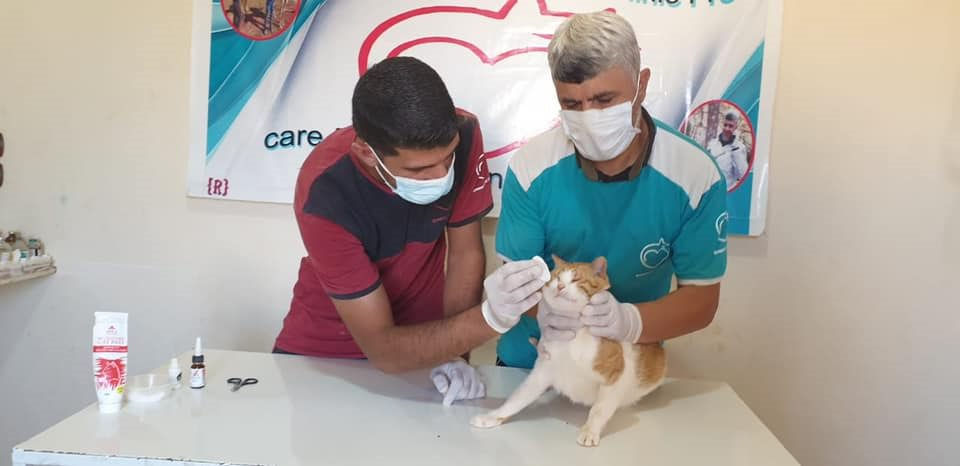Mightier Than the Sword
- Our Life Logs

- Nov 2, 2020
- 9 min read
Updated: Aug 13, 2021

| This is the 545th story of Our Life Logs® |

Writer’s note:
A very special “thank you!” to Shamsa Alsuwaidi for her invaluable help in translating the writer’s questions, and to Dr. Ali Shehata for translating Dr. Youssef’s answers—we could not have done this without both of your time and help!

What does the world think of when they hear about my home, Syria? Do they think of exploding shells, destroyed cities, crying orphans in dirty bandages walking barefoot in empty streets? Perhaps that is how it is in many places now, but not all. Still, I see these things around me every day. I see houses barren of a family’s tenderness, streets stricken with holes and explosion-craters rather than the scraping of children’s sneakers. Still, the Syria that’s emblazoned in my mind comes from a time much sweeter, and remains there, despite the terror I have experienced. It is not built on the memories of childhood, but rather, the sweetness of mercy that has touched me after the first shot was fired and one of my longest journeys began. As war erupted around me and sadness poured like rain, I learned of the kindness that persists even in the bloodiest of times. But, perhaps, I should start at the very beginning…

In 1976, I was born in Madaya, a rural town about 45 kilometers from the capital, Damascus, to a family of farmers. As I grew up in Madaya, I led the life of a typical child—I went to school every day, played and explored with my friends, and had every boy’s starry-eyed dream to be a soccer star when I grew up. Among my various childhood adventures, though, there was a presence that followed me throughout those young years. Because I grew up on a farm, I was surrounded by animals from the day I was born. Beneath my palm was always the softness of fur or feathers, and on my heels was always a cat or dog, following me as I ran across the town.
Friends came and went. Interests changed as I grew up. Yet, the animals, even if flecks of gray fur became present upon them, always walked by my side. By the time I finished high school in 1995, my childhood ambitions of being a pro athlete were replaced by a much stronger desire to help the creatures that always walked alongside me.
In my town, there was no veterinarian, despite the prevalent animal population. Whenever our animals fell ill, we had no professional to turn to. It broke my heart to think of so many animals not being taken care of. So, when it was time for me to decide my career, I chose to go into veterinary medicine.
I waved goodbye to my family and my pets and then turned my sights to Al-Baath University—a place far, far from home. My family was poor, so my time in university was not easy when it came to financing my tuition and housing. However, despite these struggles—through my determination and my family’s continued efforts and help—I was able to complete my studies. When I, at last, walked out of Al-Baath, I had a diploma in veterinary medicine in hand and my eyes on the horizon…for my home, Madaya.

I happily practiced as a veterinarian in my hometown in the coming years. My days were filled with the treatment of the gentle creatures I had known my whole life. None of their injuries were grievous—after all, we were a small, peaceful town. Perhaps I had to treat a small wound here, prescribe something there, but in all, it was a quiet job. At least, until the war came.
It was 2015. There had been unrest in the country for some time, especially since 2011 when protests began. By 2015, the conflict had completely moved into my hometown. It was as if there was a brilliant flash of lightning—the place I loved, where I had memorized every street and shop, was suddenly up in flames. In one flash of light, the entire world I’d come to know changed before my eyes.
Many stayed in the besieged town, including me. I couldn’t leave the animals behind. Since the war had come to our city, instead of treating mild injuries, I was extracting bullets from fragile, furry bodies, removing shrapnel, and busily ensuring that no animals caught near a bombing would get their wounds infected. Blood found itself onto my operating table more often than not. Still, I had a desire to help more. When there were no animals to be seen, I would help at the field hospital and treat my wounded countrymen. I was an animal doctor, yes, but I was still a doctor, and I helped the best I could in the circumstances forced upon my once calm home.

For two years, I remained in my town. Then, at the beginning of 2017, all the residents of the town were displaced to the Idlib region, which was near the city of Aleppo. As we migrated, I felt so helpless. The place I held so dearly in my heart was washed under a rain of bullets and warfare; the places I had run in so freely and joyfully…rubble crushed them until they were unrecognizable. And as for the animals, I feared for them—what would happen to the ones we couldn’t take? I was here to help, yet, even with my skills and experience, I could do nothing. It was as if I had failed my only purpose.
Yet in this torrent of emptiness, I was extended the most unexpected invitation. In rural Aleppo, I met Mohammad Alaa Aljaleel. Alaa headed a group of animal rescuers. They had founded a nonprofit and purchased land for Ernesto’s Sanctuary. The sanctuary made it their goal to save the animals who suffered from the horrors of abandonment during the war. Alaa’s group just so happened to need a veterinarian. Seeing a new purpose spring before my eyes, I eagerly joined their team.

A typical day at Ernesto’s.

In Ernesto’s Sanctuary, I not only had my job back, but I had found something greater than I had ever imagined. Amid so much loss, I had managed to gain a family. Though not related by blood, the workers at Ernesto’s Sanctuary and I were bound by the soul we put into our mission of rescuing. Together, we watched as the skies exploded, as shelling burst so near that our hearts themselves shook. We cried together whenever a creature breathed its last breath in our arms and collapsed in thanks to God when an animal woke after surgery and took its first shaky steps into a new life. In these times of the biggest extremes, all we had was one another.
Animals of all kinds poured into our sanctuary. From simple pets and farm animals to exotic creatures like tigers, we put every effort into helping save their lives. With the everyday struggles like the lingering fear of having to pick up and move, the constant worrying over whether or not we’d have enough food for the animals, let alone ourselves, a pandemic, something unbelievable like that, was not even in our thoughts.

A still of me from a video on treating a young cow.

Even with small victories and misty rumors of hope that drizzle some light on the dreariness of war, there is not one calm moment. Even if you sit to take a breather after a surgery or a rescue or even a walk, there is always worry pounding in your head. However, when we learned of the coronavirus pandemic, the news drowned out any other thought we may have had—whatever worries we had suddenly seemed so small, so uncertain. Perhaps they would happen, perhaps not.
Yet, the coronavirus—it was happening. It was sweeping our already unsteady world, breaking it apart. To think that such microscopic little pieces of the virus were bigger to me than the biggest bullets and the most monstrous of missiles frightened me. After all, we had our emergency plans at the ready if the fighting came too near—we knew our plans inside and out. We were prepared. We knew our enemy, in that case. When it came to coronavirus, though, there was no blinding light or bursting sound to let us know of its arrival. With the arrival of the pandemic, the war did not cease; in fact, an entirely new one had just begun.

As I sat one night immersed in thought, I couldn’t help but think about my family at Ernesto’s. I had my friends, those who worked with me. the animals who relied on me, who looked upon me with such trust in their eyes. It was my job to heal them. It was my job to keep them safe from whatever may try to endanger them. Yet I had no clue what I’d do if any of the animals—the cats especially, who took up most of the sanctuary—contracted the virus.
The shadow of death stuck to every corner of my world. Despite the planning, the preparing, the endless thinking, thinking, thinking of what to do, suddenly, I wondered, what would it all matter? Every smile I had shared with my sanctuary family and the love I felt for them was nothing but millions of daggers ready to pierce me at any given moment. What good would memories be if I had none of them left? Would I be alone again, cast out from all that I knew? Even in the face of all that I had done, this new challenge seemed impossible to overcome, the prospect of losing those that I love.
I glanced out at the sanctuary, the countless cats milling about, the dogs who were settling down for a nap…the stables just beyond, where the farm animals lay. They had all endured the nightmares of the war, as I had. They were left behind, forgotten. Some were blind, deaf, or missing limbs. They were right in the line of fire, in some cases. They were no human—they couldn’t defend themselves against artillery and weapons made for the sole purpose of spreading death…and yet, here they were, away from that world, enclosed in Ernesto’s. They had survived. My thoughts then wandered to my human friends—no, my family—here at Ernesto’s. We had worked together to make this place. We were maintaining something almost utterly impossible, a true safe haven within a war. We had to do everything we could to maintain it.
I glimpsed the animals once more and mustered up a shaky resolve. They had made it this far. We at Ernesto’s had made it this far. Everything was against us, and now, with coronavirus, it was even more so.
But, I thought, I will make it worthwhile. For those animals, it is my duty to serve—and my duty to survive.

After research and extra planning, my team and I developed extra safety precautions to ensure the highest level of protection for both ourselves and the animals we take care of. We always keep up on updates so we can continue to be as safe as possible. While being informed is not a magic potion, it is the best we, and rest of the world, can do.
As the months passed, I regained some of the hope that drained from my body the day I learned of the virus. The sanctuary, though not accepting visitors and field-tripping schoolchildren as it used to, continued strongly into every coming day. The animals fought to live; they would not give up. Alaa and the others still fervently believed in their goal—to become a model of animal rescuing internationally. And I maintained mine—to save those forgotten creatures in warzones.
Despite the pandemic raging on, I find myself thinking of these past months with a smile on my face, though it’s a tired one. The fear—it’s certainly still there. Yet, every time that frozenness of lost hope comes over me, all I must do is open my eyes to the side that fights the war, both this pandemic and the Syrian war—the side that fights with no weapon but love. I will continue to stay alive and fight to continue fulfilling my purpose in helping animals. It is the side that fights with the burning will, the relentless hope to live, the passion of heart mightier than any sword.

This is the story of Dr. Mohammed Youssef
Dr. Mohammed Youssef led a happy, normal life in Syria—until the war turned everything upside down. The only veterinarian in his area, he let his love for animals guide his decisions, and stayed in his hometown until he was displaced to Aleppo. Once in Aleppo, Dr. Youssef met the members of Ernesto’s Sanctuary for Cats in Syria, where he contributed to rescuing animals no matter the circumstances; even when COVID-19 manifested, he and his team carried on, letting their desire to help conquer all. Dr. Youssef is a positive person who loves sharing smiles and spending time with animals! He also likes to help those in need, especially farmers near Ernesto’s Sanctuary who have no access to medical care for their animals. One thing that Dr. Youssef may miss when life goes back to “normal” is the extra care that people exercise now. However, he dislikes how the pandemic has brought so much sadness and emptiness to the world around him. He is most worried about how he would treat his team or the animals if they contract the virus, but they are using all their resources to avoid such an event!
You can learn more about Dr. Youssef’s furry (and human!) family by visiting the Ernesto’s Sanctuary website: https://ernestosanctuary.org/ or by checking their Facebook page for frequent photo and video updates.

Dr. Youssef and his assistant treating a blind cat, 2020.

This story first touched our hearts on September 10, 2020
Writer: Safiyya Bintali | Editor: Kristen Petronio





Comments